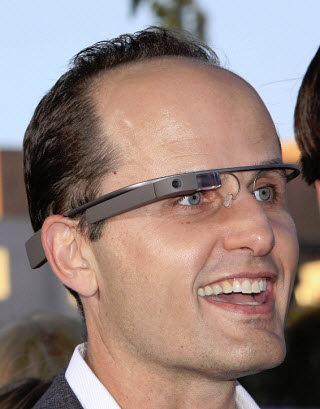Alamo Drafthouse has created a new mobile device policy.
The movie theater chain, which does not fool around when it comes to the regulations it places on its moviegoers in relation to the use of mobile gadgets inside its walls, has taken a step beyond its anti-texting policy and has banned its patrons from using Google Glass within its cinemas.
Glass may not cause disruptions but it could lead to movie piracy.
Alamo Drafthouse Founder and CEO Tim League said that the banning of the wearable device was not for the same reasons as the policies that had been put into place for smartphones. With Glass, keeping a movie theater dark and quiet is not the issue.
Glass wearers are not likely to distract and interrupt other moviegoers from watching the film, as is the case with handheld mobile devices. However, the problem with this wearable technology is it can enable its user to effortlessly and clandestinely record the movie playing on the screen. In other words, Google Glass could make it easy for a person to tape and pirate a movie.
 “We’ve been talking about this potential ban for over a year,” said League. He added that he had personally demoed Google Glass previously. “At that time, I recognized the potential piracy problem that they present for cinemas. I decided to put off a decision until we started seeing them in the theater, and that started happening this month.”
“We’ve been talking about this potential ban for over a year,” said League. He added that he had personally demoed Google Glass previously. “At that time, I recognized the potential piracy problem that they present for cinemas. I decided to put off a decision until we started seeing them in the theater, and that started happening this month.”
Alamo Drafthouse is not the first movie theater chain to ban Google Glass.
In January of this year, AMC banned the wearable from its theaters when an incident involving the eyewear occurred at one of their Ohio theaters, which resulted in the calling of homeland security officers to interrogate a customer who was wearing Glass while watching Jack Ryan: Shadow Recruit. AMC stated that wearing a device with video recording capabilities isn’t “appropriate at the movie theater.”
Although Alamo Drafthouse has prohibited Google Glass, the policy is not exactly clear-cut. Just like cell phones, the device will need to be shut off once the trailers begin but, in some cases, users may still need to wear the device in situations where they need to rely on the prescription lenses in the glasses to view the screen. Thus, depending on the circumstance, a specific policy may need to be enforced on a case by case basis.
These devices are becoming very popular in the country but so is their development.
A leading tech evangelist in the United States, Robert Scoble, has announced that he feels that Israel will become an important driving force when it comes to the development and shipment of wearable technology in the not too distant future.
He expressed that he feels that we will soon all be donning wearables and many will come from Israel.
Scoble stated that “I think a lot of wearables will come out of Israel”. From the looks of the way that things have been moving, he may be completely right, particularly in terms of the overall adoption of the devices. Wearable technology was virtually unheard of only a couple of years ago, and now it feels as though a new type of device is being launched with each passing week. Everything from smartwatches that can take pictures and receive text messages to fitness bands, and even clothing embedded with sensors that can provide biofeedback and eyeglasses that allow the wearer to surf the web is now available on today’s tech shelves. There are even baby diapers and dog collars already out.
If Scoble is right, as the next waves of wearable technology are released, they will include Israeli innovations.
 Scoble had been in Israel last month as he attended many different events surrounding this first year of the WearableTech Conference, which took place in Tel Aviv. There, participants from a number of different countries looked into the ways in which Israel would be capable of contributing to the wearables sector. What they found was quite promising.
Scoble had been in Israel last month as he attended many different events surrounding this first year of the WearableTech Conference, which took place in Tel Aviv. There, participants from a number of different countries looked into the ways in which Israel would be capable of contributing to the wearables sector. What they found was quite promising.
He pointed out that there is already an infrastructure in place for the expansion of wearables and there are already a number of companies that conduct similar types of research, development, and other related activities within the country. Moreover as Israel also holds a considerable amount of expertise in the area of inkjet printing, the potential for transistors to be sprayed onto virtually anything has also been mentioned.
The Orcam smart glasses have been created there for individuals who are visually impaired, and Intel recently purchased Omek gesture recognition software for $40 million. Clearly, Israel is providing a source of many different elements that can make up a complete wearable technology package.
 “We’ve been talking about this potential ban for over a year,” said League. He added that he had personally demoed Google Glass previously. “At that time, I recognized the potential piracy problem that they present for cinemas. I decided to put off a decision until we started seeing them in the theater, and that started happening this month.”
“We’ve been talking about this potential ban for over a year,” said League. He added that he had personally demoed Google Glass previously. “At that time, I recognized the potential piracy problem that they present for cinemas. I decided to put off a decision until we started seeing them in the theater, and that started happening this month.”
 Scoble had been in Israel last month as he attended many different events surrounding this first year of the WearableTech Conference, which took place in Tel Aviv. There, participants from a number of different countries looked into the ways in which Israel would be capable of contributing to the wearables sector. What they found was quite promising.
Scoble had been in Israel last month as he attended many different events surrounding this first year of the WearableTech Conference, which took place in Tel Aviv. There, participants from a number of different countries looked into the ways in which Israel would be capable of contributing to the wearables sector. What they found was quite promising.